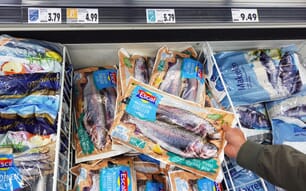They were produced by the Salmon Aquaculture Dialogue: a 500-person roundtable that includes salmon aquaculture industry leaders, scientists and representatives from non-governmental organizations.
The standards, which are expected to be finalized in approximately six months, will be the first global standards for salmon aquaculture created through an open, transparent process that is aligned with the International Social and Environmental Accreditation and Labeling Alliance’s renowned guidelines for creating standards.
“One of our priorities has been getting as many people as possible engaged in the process so that we can tap into their expertise and on-the-ground experiences,” said Katherine Bostick of WWF, who coordinates the Dialogue. “This is reflected in the draft standards document, which includes innovative standards that will help change the way salmon is farmed worldwide.”
The first comment period will end on Oct. 3, 2010. The second comment period will begin approximately two months later.
The Dialogue seeks to minimize or eliminate the key negative impacts associated with salmon aquaculture, such as sea lice spreading from salmon farms, escaped farmed salmon interbreeding with wild salmon populations, and conflicts within communities regarding shared coastal resources.
Salmon aquaculture is responsible for producing two-thirds of the salmon consumed worldwide. The remaining salmon is wild-caught.
Numerous multi-day Dialogue meetings geared toward sharing information and discussing ideas on how to shape the standards have been held in key salmon producing regions – including Norway, Chile, Scotland and British Columbia – since the process began in 2004.
Feedback was also provided during previous public comment periods held in 2008 and 2009 to vet the draft principles, criteria and indicators, as well as outreach meetings over the last several years with salmon industry stakeholders. Experts assisted, as needed, in evaluating salmon-related science to help shape the draft standards.
“We’ve come a long way and are excited about the progress that has been made in creating the standards,” added Petter Arnesen of Marine Harvest, a member of the nine-person Steering Committee that manages the
Dialogue process. “The Steering Committee is eager to get feedback during this comment period that will help us revise the standards and wrap up the process.”
The start of the public comment period is a major milestone for the Aquaculture Dialogues, a set of eight roundtables working to create measurable and performance-based standards for responsible aquaculture.
Six sets of draft standards (pangasius, freshwater trout, abalone, shrimp, bivalves and salmon) are in the process of being reviewed or finalized and one set of standards (tilapia) is finalized. All of the standards are expected to be completed within approximately six months.
The standards will be amended periodically to reflect changes in science and technology, as well as to encourage innovation and continuous improvement. These revisions will be coordinated by the Aquaculture Stewardship Council (ASC), the new entity being developed to manage the standards, and the process will include many of the Dialogue participants.
We believe this sends a very strong message to Scottish politicians, who have dragged their heels on the issue of smolt pens in salmonid lochs, said Tony Andrews, Chief Executive of the Atlantic Salmon Trust.
For several years Fiona Cameron, who works with the Atlantic Salmon Trust and the Sea Trout Group, has lobbied politicians, the industry and the Salmon Aquaculture Dialogue, calling for smolt pens in salmonid lochs to be banned, and replaced by closed containment systems. Scotland has been lagging behind in adopting closed containment technologies for raising smolts, although the campaign led by Fiona has been successful in raising awareness of how damaging the current practice of using open cages is.
We have campaigned for many years to have smolt pens banned from salmon and sea trout systems, said Dr Andy Walker, Chairman of the Sea Trout Group.
The presence of these pens appears to be interfering with the natural behaviour of migratory fish. Its also generally accepted that, alongside the occasional and well-publicised large-scale escapes from such pens, theres an ongoing leakage of small numbers of fish, amounting to large numbers over time. These losses of fish from captive culture pose a very serious threat to the gene-pool of wild salmon. In addition, while fish farmers may do all they can to avoid diseases among their stocks and treat them where they need to, we are concerned that open pens containing intensively reared fish increase the risk of pathogens spreading to susceptible wild fish, whose health status is very difficult to monitor effectively and whose treatment in the event of an outbreak is completely impracticable.
Recirculating aquaculture systems (RAS) are used for this stage of farming in the other countries which produce salmon, so the technology is thoroughly tried and tested, and easily available. We simply do not believe that salmon can be farmed sustainably in open net pens in freshwater systems which contain migratory fish, and the standard which SAD is working towards is all about sustainability, commented Tony Andrews.
The retailers who sell farmed salmon are keen to see ASC-certified fish on their shelves, and we believe that this fact alone will encourage the Scottish industry to adopt the more sustainable option. It will involve initial high capital expenditure by salmon producers, but the experience of other countries indicates that the use of modern RAS units can bring great benefits to the farmers themselves. For instance, they can be much more flexible about the timing of transfer of smolts to sea cages, and that will give them the option to grow fish on to a larger size before transferring them to sea. This may well bring many additional benefits, since a shorter time in sea cages could mean less infestation by sea lice, added Mr Andrews.
The draft criteria for the Aquaculture Stewardship Council salmon standard will now go out to public consultation for 60 days. Details can be found on the SAD website at: http://www.worldwildlife.org/what/globalmarkets/aquaculture/dialogues-salmon.html
Making The Salmon Industry More Sustainable
US - Draft standards to improve the environmental and social sustainability of the salmon aquaculture industry were released yesterday for public comment.


